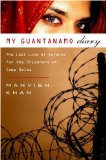Summary | Excerpt | Reviews | Beyond the Book | Readalikes | Genres & Themes | Author Bio

Critics' Opinion:
Readers' Opinion:
First Published:
Jun 2008, 320 pages
Paperback:
Jun 2009, 320 pages
 Book Reviewed by:
Book Reviewed by:
Lesley Marshall
Buy This Book
At last, he had hope. A trial would be an opportunity to show his captors that his arrest had been a mistake.
...
On January 15, 2005, guards led him from Camp Delta to a small room for the hearing. The Bush administration designed the CSRT in response to the U.S. Supreme Court ruling that Guantánamo detainees should be allowed to challenge their detention before an impartial judge, who would be a military officer. The hearing is supposed to determine whether a detainee is an enemy combatant and therefore not entitled to normal legal rights. But in most cases, the CSRTs are little more than dog and pony shows. They admit hearsay and evidence obtained through torture and coercion. They don’t allow prisoners lawyers, witnesses, or even the right to see the alleged evidence against them. CSRTs are a sham, designed to confirm a decision that has already been made.
...
The panel’s first accusation: “The detainee is associated with the Taliban and/or al-Qaeda.”
“Not only do I have nothing in common with the radical Taliban or extremist al-Qaeda, I am completely against their ideology!” Mousovi responded. He had been a refugee in Iran during the entire Taliban rule, he said. He had refused to set foot in his country for even a day to tend to his personal property while the Taliban held his homeland hostage and looted his home and estates.
In Iran, Mousovi had been forced to work as a taxi driver, a tailor, and a tutor to feed his family. But he hadn’t even thought about taking his family back to Afghanistan.
“I am a Shiite Muslim,” he said, “and they looked at Shiites as infidels. As enemies. They butchered my people. The Shiites were an endangered minority with no political voice under the Taliban. If I had associations with them, why wouldn’t I have returned to my country?”
Far from associating with the Taliban, Mousovi insisted that he was a zealous supporter of Afghan democracy. After coalition forces ousted the Taliban, he returned to his country in
April 2002 and worked with the United Nations to help increase support for a new democratic Afghanistan. In June of that year, he also attended the first loya jirga, an internationally backed assembly of leaders who met in Kabul to select Hamid Karzai as the country’s post-Taliban head of state.
But the military panel accused him of going to Afghanistan to funnel money to anticoalition insurgents.
“Please. Tell me, which money?” he asked. “This is imaginary, invisible and psychic money. I was in Gardez for just two days, so what happened with this money?”
The tribunal president said that the evidence concerning the money was classified. The panel proceeded to accuse Mousovi of distributing money, food, and Kalashnikov rifles to al-Qaeda fighters preparing to fight the United States, allegedly before the Taliban was defeated, even though Mousovi was in Iran at the time.
Finally, he was accused of fighting in the U.S.-backed war against the Soviet invasion of Afghanistan in the 1980s. This was something that the United States had wanted and encouraged
Afghans to do. Now, Mousovi was being forced to respond to this allegation as if it were a crime.
He didn’t deny his support of the mujahideen during their fight against the Russians. He had been a medic helping wounded resistance fighters. There were still bullet fragments lodged in the muscles of his neck, where he had been shot twenty-eight years before by a Russian soldier.
Mousovi had hoped for some clarity. He had hoped that the tribunal would see that there had been a mistake. Instead, his day in court left him confused.
“It’s still not clear to me what I am being charged with,” he said. “Is it my fault, or is it my sin, that I fought against the Russians? That I fought against communism? Or was it my sin that I didn’t associate with the Taliban? Or maybe it is my fault that after the establishment of democracy, I returned to my country to serve my people and help my people and our national security with the loya jirga? Or maybe it was my fault because my people love me and thought of me as a good servant.”
From the book My Guantánamo Diary by Mahvish Khan. Reprinted by arrangement with PublicAffairs (www.publicaffairsbooks.com), a member of the Perseus Books Group. Copyright © 2008.





The Flower Sisters
by Michelle Collins Anderson
From the new Fannie Flagg of the Ozarks, a richly-woven story of family, forgiveness, and reinvention.

The House on Biscayne Bay
by Chanel Cleeton
As death stalks a gothic mansion in Miami, the lives of two women intertwine as the past and present collide.

The Funeral Cryer by Wenyan Lu
Debut novelist Wenyan Lu brings us this witty yet profound story about one woman's midlife reawakening in contemporary rural China.
Your guide toexceptional books
BookBrowse seeks out and recommends the best in contemporary fiction and nonfiction—books that not only engage and entertain but also deepen our understanding of ourselves and the world around us.